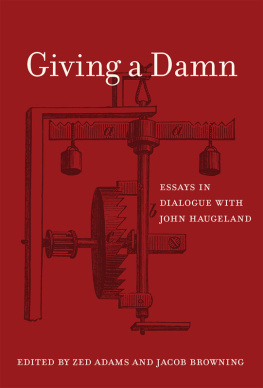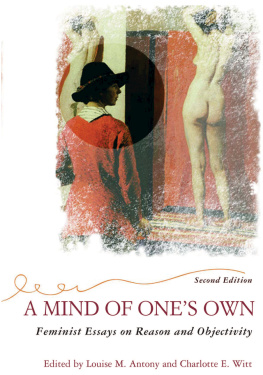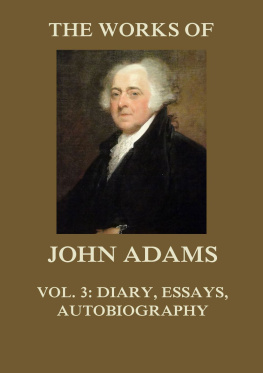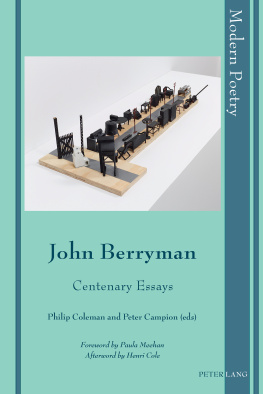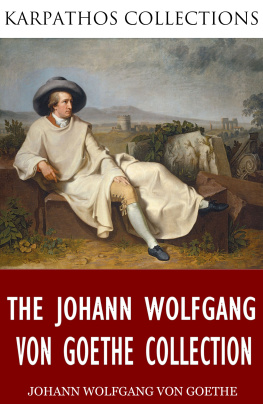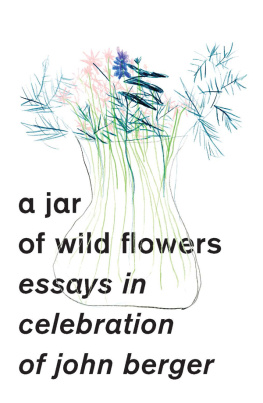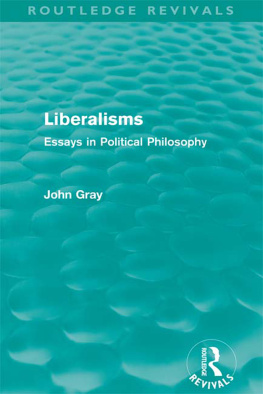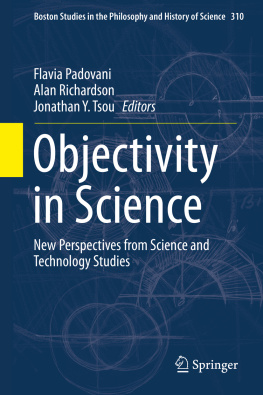Adams Zed - Giving a damn: essays in dialogue with John Haugeland
Here you can read online Adams Zed - Giving a damn: essays in dialogue with John Haugeland full text of the book (entire story) in english for free. Download pdf and epub, get meaning, cover and reviews about this ebook. City: Cambridge;Massachusetts, year: 2017, publisher: MIT Press, genre: Religion. Description of the work, (preface) as well as reviews are available. Best literature library LitArk.com created for fans of good reading and offers a wide selection of genres:
Romance novel
Science fiction
Adventure
Detective
Science
History
Home and family
Prose
Art
Politics
Computer
Non-fiction
Religion
Business
Children
Humor
Choose a favorite category and find really read worthwhile books. Enjoy immersion in the world of imagination, feel the emotions of the characters or learn something new for yourself, make an fascinating discovery.
- Book:Giving a damn: essays in dialogue with John Haugeland
- Author:
- Publisher:MIT Press
- Genre:
- Year:2017
- City:Cambridge;Massachusetts
- Rating:3 / 5
- Favourites:Add to favourites
- Your mark:
- 60
- 1
- 2
- 3
- 4
- 5
Giving a damn: essays in dialogue with John Haugeland: summary, description and annotation
We offer to read an annotation, description, summary or preface (depends on what the author of the book "Giving a damn: essays in dialogue with John Haugeland" wrote himself). If you haven't found the necessary information about the book — write in the comments, we will try to find it.
Adams Zed: author's other books
Who wrote Giving a damn: essays in dialogue with John Haugeland? Find out the surname, the name of the author of the book and a list of all author's works by series.
Giving a damn: essays in dialogue with John Haugeland — read online for free the complete book (whole text) full work
Below is the text of the book, divided by pages. System saving the place of the last page read, allows you to conveniently read the book "Giving a damn: essays in dialogue with John Haugeland" online for free, without having to search again every time where you left off. Put a bookmark, and you can go to the page where you finished reading at any time.
Font size:
Interval:
Bookmark:
edited by Zed Adams and Jacob Browning
The MIT Press
Cambridge, Massachusetts
London, England
2017 Massachusetts Institute of Technology
All rights reserved. No part of this book may be reproduced in any form by any electronic or mechanical means (including photocopying, recording, or information storage and retrieval) without permission in writing from the publisher.
This book was set in Stone Sans and Stone Serif by Toppan Best-set Premedia Limited. Printed and bound in the United States of America.
Library of Congress Cataloging-in-Publication Data is available.
ISBN: 978-0-262-03524-8
eISBN: 978-0-262-33584-3
ePub Version 1.0
First and foremost, we would like to thank the contributors, not just for their contributions but also for their patience with the project and the trust they have put in us as editors. Thanks especially to Joseph Rouse, who consistently encouraged us to make this volume something that would have made John proud.
We also owe thanks to a number of people for commenting on the introduction in various stages of completion: Matthew Dougherty, Jay Elliott, Nat Hansen, Daniel Harris, Joe Lemelin, Eric MacPhail, Kevin Temple, Janna Van Grunsven, and Zach Weinstein.
A final thanks goes to Philip Laughlin at the MIT Press, for all his feedback and support, and to Joan Wellman, for agreeing to allow us to publish Johns Two Dogmas of Rationalism and his outline of Kants transcendental deduction.
Throughout the book, we have used the following abbreviations to refer to John Haugelands works:
- TU: Truth and Understanding (dissertation, UC Berkeley, 1976)
- AI: Artificial Intelligence: The Very Idea (MIT Press, 1985)
- HT: Having Thought (Harvard University Press, 1998)
- PMR: Philosophy of Mental Representation (edited by H. Clapin; Clarendon Press, 2002)
- DD: Dasein Disclosed (edited by J. Rouse; Harvard University Press, 2013)
Zed Adams and Jacob Browning
I suggest that we cant really have understood the human mindand, in particular, with regard to its very distinctive capacity (perhaps only a few thousand years old) to seek objective truthuntil we have understood its capacity for faithful commitment. But this is quite different from anything like a belief or a desire, let alone competent negotiation of the immediate environment. This essential topic for cognitive science has, I think, not yet even made it to the scientific horizon.
John Haugeland, Andy Clark on Cognition and Representation (PMR, 3536)
John Haugeland thought that a fundamental problem with contemporary philosophy is that we are working with an impoverished set of tools. The problem is that if we dont have the right tools, its going to be awfully hard to get the job done. As a solution, Haugeland proposed to massively expand the array of concepts that we work with in philosophy, to include a much wider range of resources for understanding the mind, the world, and how they relate.
Haugelands willingness to radically expand our conceptual tool kit is bound to strike many as an ontological extravagance. To this sort of worry, Haugeland had a ready response:
I have occasionally wondered what makes ontology so expensive, or what limits our budget, or, indeed, what exactly we are spending. Having dwelt more summers in the southwest than the northeast, I feel no great longing for desert landscapes; and frankly, Ockhams razor cuts little ice out there anyway. Perhaps, however, I can abide a prudent California compromise: We shall assume no entity before its time. (HT, 113)
Over the course of his career, Haugeland proposed a number of new entities that he thought helped us to better understand ourselves and our place in the world. The problem with these presuppositions is that they narrowly focus our attention on a specific aspect of human lifemaking claims about factsand treat it as the only way we engage with the world. As a corrective to this narrow focus, Haugeland draws our attention to some of the existential dimensions of human life. Specifically, he draws our attention to the centrality of understanding, our basic ability to make sense of things. For Haugeland, there is not one type of understanding but as many varieties as there are varieties of human social practices. As he puts it, Understanding hammers is knowing how to hammer with them, understanding a language is knowing how to converse in it, understanding people is knowing how to interact and get along with them, and so on (DD, 195). Understanding is about being able to skillfully cope with the world in all its complexity.
Haugelands determination to expand our conceptual tool kit led him to write about a variety of topics and figures that are often seen as lying far apart: from topics in cognitive science and the philosophy of mind to figures such as Martin Heidegger and Thomas Kuhn. The primary goal of this introduction is to articulate some of the connections between these topics and figures so as to provide an account of how Haugeland integrated them into a unified philosophical view. Our strategy is to revisit a number of Haugelands most influential essays and organize them into a series of complementary topics: holism, sociality, embodiment, truth, and commitment. In each section, we set out the background context for his writings on that topic, as well as what we take to be the big ideas that come out of his engagement with it. Our aim is to show how Haugelands ideas have provided a lasting legacy for thinking about the nature of human mindedness. In some cases, such as his criticism of the computational model of the mind, or his defense of embodied cognition, Haugelands once controversial ideas are now far more widely accepted. But in other cases, Haugelands claims are so bold that they are difficult (even for us) to accept at face value. Regardless of whether his ideas are now more accepted or outlandish, our goal is to present them in a way that makes them philosophically enticing. We aim to motivate others to read or reread Haugeland not just as a significant figure in cognitive science and philosophy of mind at the turn of the millennium but as a philosopher whose work continues to speak to our central concerns about mindedness today.
Before we start, one caveat is worth mentioning: in our reading, Haugelands own view underwent a significant revision over the course of his career. Accordingly, we will speak of his early view and his late views. We also spell out some of the continuities and discontinuities between these views. Taken as a whole, Haugelands philosophical career is a vivid illustration of his own late view that an existential commitment to getting things right is a risky, demanding, and ultimately necessary prerequisite to genuine understanding.
The trouble with artificial intelligence is that computers dont give a damn.
John Haugeland, Understanding Natural Language (HT, 47)
Haugelands writing career began with a series of critical discussions of the prospects for the success of the computational theory of the mind, or, as he called it, GOFAI (Good Old-Fashioned Artificial Intelligence). Haugelands writings on this topic are remarkably evenhanded: he makes every effort to spell out the attractions of GOFAI and never attempts to argue that it is an incoherent research program. His book on the topic, Artificial Intelligence: The Very Idea (1985), is notable in this regard. Although Haugeland ultimately remains skeptical about the prospects for GOFAIs success, much of the book is dedicated to giving a detailed account of what makes GOFAI philosophically rich and exciting. Perhaps most importantly, Haugelands book uses GOFAI as a test case for a set of philosophical commitments whose influence extends far beyond debates in artificial intelligence.
Font size:
Interval:
Bookmark:
Similar books «Giving a damn: essays in dialogue with John Haugeland»
Look at similar books to Giving a damn: essays in dialogue with John Haugeland. We have selected literature similar in name and meaning in the hope of providing readers with more options to find new, interesting, not yet read works.
Discussion, reviews of the book Giving a damn: essays in dialogue with John Haugeland and just readers' own opinions. Leave your comments, write what you think about the work, its meaning or the main characters. Specify what exactly you liked and what you didn't like, and why you think so.

